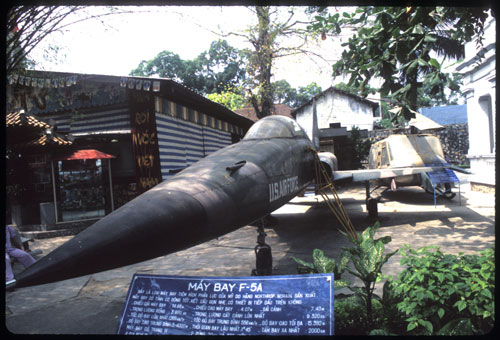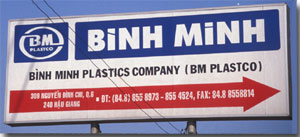Part 4 in a series of travelling among former enemies

Memento Belli, Saigon War Museum ©1997 UrbisMedia
It’s a little like walking into a shop in East Jerusalem where you don’t quite know whether to say Shalom or Salaam. In Saigon—ooops, Ho Chi Minh City—there is the abiding ambiguity blurring whose city this really is. If religious, or ideological, hegemony is the arbiter of such matters, it doesn’t really do much against custom, or just the feel of the place. Then again, nobody’s making a case to change the lyrics fromOn the Town to “Neiuw Amstrerdam, Nieuw Amsterdam, It’s a Vunderful Town!”
HCMC was Saigon, and will always remain so in many minds. Even the communists seem to recognize this, splitting the difference by letting the central district of HCMC still be referred to as Saigon. That also reflects the tenor of the place as well; no one would mistake HCMC as a place where socialism rules. Consistent with the practice of market capitalism underneath the rubric of doi moi , a sort of perestroika that encourages “joint ventures” with foreign capitalists, HCMC comes off as a rollicking mercantile bazaar. In the bar of the somewhat venerable Continental Hotel, where Graham Greene penned much ofThe Quiet American , the discussion is no longer about the fortunes of the French versus the Viet Minh, but the fortunes that might be made in joint ventures. A couple of lounges over an assembly of western-suited Asians and a couple of Americans wheel and deal in Korean, Vietnamese, and English, with apparent cell phone mediated negotiations by a couple of interpreters. We try to eavesdrop surreptitiously, but there seems little concern that we might get the jump on a good development deal or a hot commodity for export, not more so than that there might be some government spook ready to blow the whistle on these Nguyen Van Trumps and Kim Sung Gates. They are not the only gaggle of entrepreneurs in the bar; knots of negotiation are in spirited progress in other corners and one wonders if some of the cell phone conversations taking place are between one group and another. What would Uncle Ho think? Heck, what would Graham Greene think?
The Vietnamese are clearly out to make a buck by getting into the SE Asian economic dragon sweepstakes. Americans, who clearly associate the country with its ill-advised war with them, will find little evidence of that past or interest in discussing it when there is a buck to be made. Doi moi might have had the intention to spur foreign trade and investment, but the little people took it as license to get a piece of the action and small businesses have proliferated. The proletariat knows, like their fellow little people elsewhere, that you are going to get screwed by whatever ideology is in power. The Vietnamese have gone for decades trying to find one good day and follow it with another, and this hiatus means to them to “make hay while the sun shines.”
Or while it doesn’t shine. Binh and Minh are cyclo drivers, or more accurately “peddlers” of the rear bike powered rickshaws that ply Saigon streets among the throngs of motorbikes whizzing willfully in any direction they choose. So my friend Sue and I might have demurred on the importuning of Minh, the English-able of the two, to lay our five bucks and get what used to be called at Dinseyland, and E-Ticket ride through the Saigon streets at night. With me in Minh’s cyclo and Sue in Binh’s we charged intro the furious traffic of motorbike’s overloaded with everything from furniture to entire families. I was interrogated about America by Minh, who had aspirations to study there and become a success.
Like the rest of two thirds of Vietnam’s population that has been born since the end the war, Minh seemed to have little interest in discussing it. Only when we were passing the former American Embassy from which the last of us escaped to the roof and onto helicopters did Minh direct my attention to the most prominent icon of our ignominy and betrayal. But we were quickly off the subject of the war.
Both Binh and Minh live well outside the city, so they often sleep in the seats of their cyclos rather than peddle miles to the countryside. We chatted a while more when we got back to the hotel and the cyclostand that they operate from. They were probably trying to increase the generous tips we gave them (equivalent to a Big Mac Value Meal, not supersized). I liked these guys and came out later in the night for another ride with Minh along the waterfront. He got another big tip and I threw in a little more for his buddy, Binh. I couldn’t help think of them when I came across a sign advertising a plastics company; maybe they’ll make it someday.
If Vietnam can keep the peace. For the present the past war is consigned to a musty outdoor museum of American military hardware. Aside from false dog tags, military Zippo lighters and “Hueys” sculpted from Coke cans, there is scant evidence or commercial exploitation of the war. If you’re not a claustrophobe, and I am, you can climb through the former enemy tunnels near the airport. But the dusty museum’s display of the history of the war is unambiguous on one thing: America was in the wrong, and America lost. When I went through the room there was one other person in there, another American. We looked at the fading newspaper articles, many from American papers, and other artifacts, impressed that photos we had seen before could be given such a different interpretation. On they way out the American, who was probably too young to have served in the war commented, with a wry smile: “Well, the winners get to write the history.” I realized that I had not been thinking about the Vietnamese as “winners.”
 ___________________________________
___________________________________
©2004, James A. Clapp (UrbisMedia Ltd. Pub. 9.6.2004)
